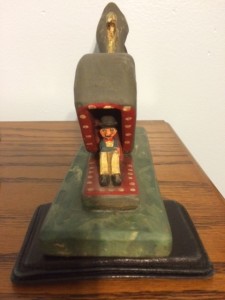It ain’t necessarily so, it ain’t necessarily so.
De t’ings dat yo’ li’ble to read in de Bible,
It ain’t necessarily so.
When you read the Bible as a child, you remember heroic and fantastic images that later challenge your credulity. In adulthood the authority of the Bible collapses in disillusionment as the narrator of “It ain’t neceesarily so” articulates. About Jonah, the songs says,
Oh, Jonah, he lived in de whale, oh, Jonah, he lived in de whale.
Fo’ he made his home in dat fish’s abdomen.
Oh, Jonah, he lived in de whale.
The part we all remember is the fish, which is mentioned in two of the forty-eight verses of Jonah. So the redemption of a prophet and a major capital of ancient civilization is reduced to this:
In my recollection Jonah was about a man who tried to run from God. [What a doofus!] He was confined to a whale for three days to get his head straight [Served him right!], and finally agreed to do his job: preach to the city of Nineveh. But he was a still a doofus, because he didn’t like God showing mercy on the Ninevites. The final chapters seemed like an epilogue and not very important.
But a re-reading of the story later in life evokes God’s mercy in ways we don’t see in other Old Testament literature. Psalmists extol God’s mercy, and historians explain forgiveness of the Hebrew people in light of God’s mercy, but mercy comes in waves in this story, one right behind the other. And the story spans the limits of the known world. Jonah himself seems like a minor character in a cosmic drama.
First there is the mercy the sea-farers had on Jonah, when it seemed like he was the inevitable cause of their ship perishing in the storm. It becomes obvious after their interrogation of Jonah that he is the cause and Jonah himself says to them:”I know it is because of me that this great storm has come upon you” (Jonah 1:12). What did they do? “Nevertheless the men rowed hard to bring the ship back to land” (13). They didn’t want to take out their misfortune on Jonah, in spite of the fact he had spent the worst part of the storm sleeping below. They had mercy on him until finally they had no choice, but to rid the ship of him.
Once in the water, Jonah does not perish because “the Lord provided a large fish to swallow up Jonah”(17). This part of the story is usually read as the low point for Jonah, but the text says “the Lord provided,” so while the accommodations were not Five Diamonds, the story suggests that God has saved Jonah, rather than executing him. Jonah says about this imprisonment:
I went down to the land whose bars closed upon me forever;
yet you brought up my life from the Pit,
O Lord my God.
So we are intended to read the fish incarceration as God’s mercy.
Next, God has mercy on Nineveh, “in which there are more than a hundred and twenty-thousand persons, who do not know their right hand from their left, and also many animals” (4:11). This verse touches the heart of mercy, sparing a people who have directional confusion, a metaphor of pathetic helplessness. When we speak of people who don’t know their right hand from their left, it is inevitably in mockery. There are a lot of graphic metaphors indicating how stupid people are by their poor differentiation of one body part from another, and none of them imply we should have mercy on such people. Yet God Almighty does.
The entire fourth chapter of Jonah is devoted to a parable about how the prophet was embittered because God allowed a sheltering bush to perish in one day. God argued that a bush to Jonah was not nearly as significant as a mighty city was to God. Many people know about Jonah and fish, but few would recall Jonah and the bush, a story with far more ethical implications. This chapter is bursting with the news of God’s mercy on all mankind and not merely on his chosen people.
So God schools Jonah about the wideness of his mercy, filling the final chapter with a parable and an explicit conclusion, “should I not be concerned about Nineveh. . .?” This seems to be the point of the story, not that a huge fish kept Jonah hostage for three days. Often the trailer for the movie overrides the depth of its message. And so with Jonah.
Nineveh is often considered the precursor of the modern city, and so its redemption is a modern parable. The king takes Jonah’s prophecy to heart and commands a city-wide repentance. “Who knows?” the king reflects. “God may relent and change his mind; he may turn from his fierce anger, so that we do not perish” (3:9). The words suggest humility, not that the citizens will dissuade God, but that God will change his mind. This has a whiff of the Prodigal Son who returned to his father, not to regain his previous place in the family, but to be accepted as a hired servant. The offender leaves the initiative up to God, while the repentance serves to answer the offense. Intellectually the idea of God changing his mind is unimaginable, but through faith, all things are possible. The king of Nineveh speaks for his urban descendants today. We may not know our right hand from our left, but God has not given up on us.

